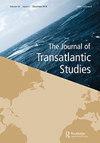Transatlantic Trotsky
Q1 Arts and Humanities
引用次数: 0
Abstract
Few historical figures of the 20th century are as intriguing from a Transatlantic perspective as Leon Trotsky. Trotsky can be thought of as “transatlantic” in at least three ways. First, and perhaps most obviously, we can consider Trotsky’s transnationalism in terms of the internationalist basis and verve of his political theories. Second, we might explore how Trotsky’s exilic fate placed him in contact with intellectuals, followers and enemies in multiple linguistic and cultural communities in Europe, Turkey and the Americas—places in which he could further observe the “unevenness” of capitalism in space and time. Third, we might consider the cultural representations of the Old Man’s exile and assassination at the hands of a Catalan Stalinist agent, Ramón Mercader, in Coyoacán Mexico in 1940, whereupon the Revolutionary leader becomes a vessel of Hispanic Atlantic contemplation and circulation.跨大西洋托洛茨基
从跨大西洋的角度来看,20世纪很少有历史人物像列夫·托洛茨基那样引人入胜。托洛茨基至少在三个方面可以被认为是“跨大西洋者”。首先,也许是最明显的,我们可以从托洛茨基的国际主义基础和他的政治理论的精神来考虑他的跨国主义。其次,我们可以探索托洛茨基的流亡命运如何使他与欧洲、土耳其和美洲的多种语言和文化社区的知识分子、追随者和敌人接触——在这些地方,他可以进一步观察资本主义在空间和时间上的“不均匀性”。第三,我们可以考虑1940年在Coyoacán墨西哥,老人被加泰罗尼亚斯大林主义特工Ramón Mercader流放和暗杀的文化表现,从此这位革命领袖成为西班牙裔大西洋思考和流通的船只。
本文章由计算机程序翻译,如有差异,请以英文原文为准。
求助全文
约1分钟内获得全文
求助全文
来源期刊

Journal of Transatlantic Studies
Arts and Humanities-History
CiteScore
0.90
自引率
0.00%
发文量
15
期刊介绍:
The Journal of Transatlantic Studies is the official journal of the Transatlantic Studies Association. It began publication in 2003. The focus is on the transatlantic region broadly defined to include the Americas and the Caribbean in the west and Europe extending to Russia the Middle East and Africa in the east.The Journal explores and provides multi-disciplinary analysis of this vital region of the world through engagement principally with: - History - Literature - IR and Security Studies - International Law and Organisation - Culture and Race - Slavery and Migration - Film - Economics and Business Studies - Planning and the Environment It is published quarterly and accepts proposals for themed issues as well as individual articles between 5-12,000 words in length. It also has a short book review section. Two peer reviewers evaluate all submissions and any manuscript that divides opinion is then submitted to a third peer reviewer for a final decision. The JTS aims to provide decisions on submissions within 12 weeks.
 求助内容:
求助内容: 应助结果提醒方式:
应助结果提醒方式:


